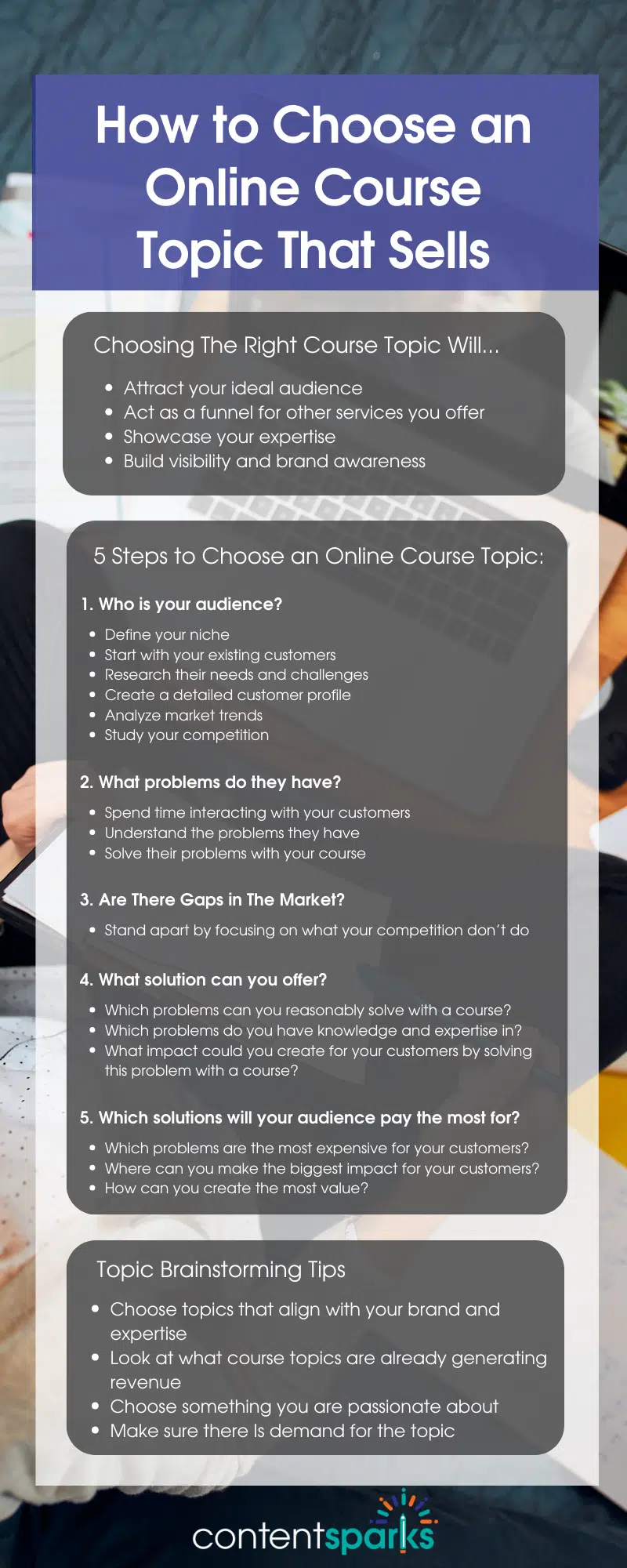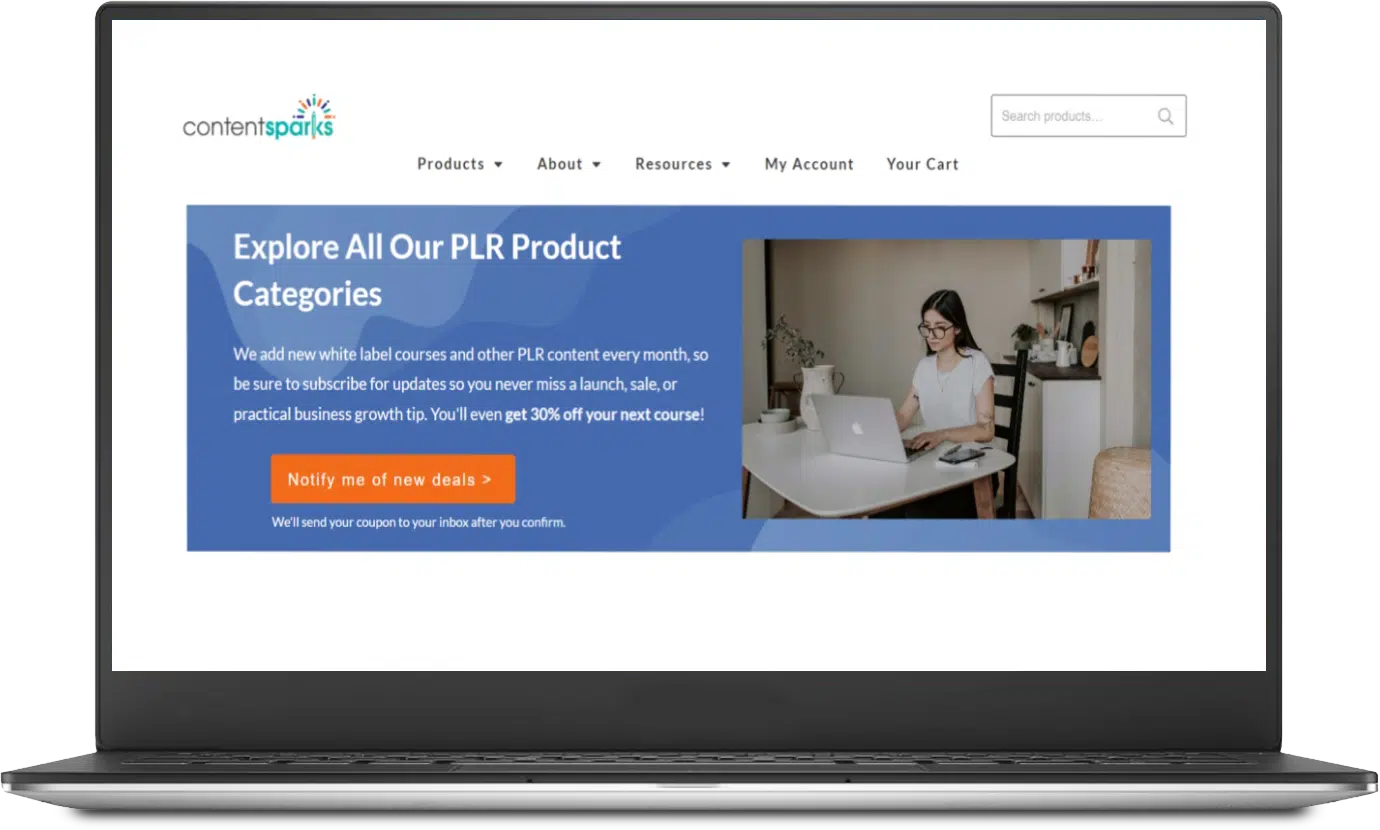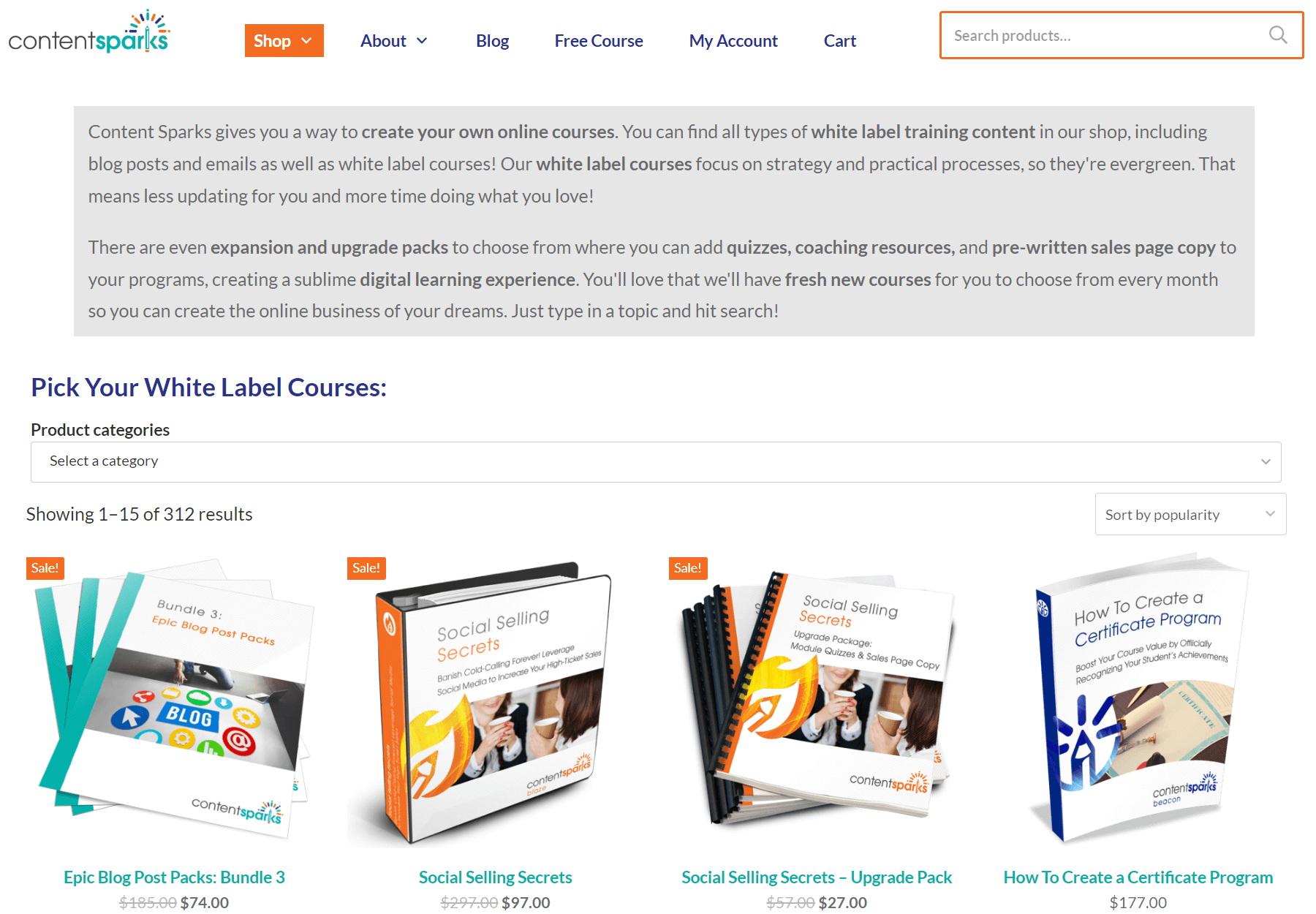How to Choose an Online Course Topic That Sells
0 comments
0 comments
Looking for a six-figure stream of revenue to add to your business (without it soaking up all your time)?
Sell a course. Selling an online course can be extremely profitable and an excellent way to passively grow your business. Choose your next course topic wisely though. The topic you choose will heavily impact how successful you are, and how many sales you make.
If you’re overwhelmed or worried that you can’t come up with a good topic, don’t be. I know exactly how it feels when you’re looking at a blank screen wondering when the good ideas will appear. I’ll walk you through my process for choosing a course topic that captures the interest (and imagination) of your audience, solves their problems, and opens their wallets.

Choose the wrong topic for your course and there’s one direction you’ll go: downhill. Or rather, it probably won’t go anywhere - which is just as disappointing after all the hard work of creating a course.
Choose the right topic and you'll set your course up for success from the get-go and improve your chances of making a tidy profit. While there are countless reasons why choosing the topic of your next course is one of your most critical decisions, here are my top four:
The right course is like a shining beacon for your target audience, drawing them closer to your business.
As students pour in, your email list will grow, giving you a larger audience who will want to buy your other products and services as well as additional courses. I’ll touch on this later as I show you how to choose a topic that your audience will care about and be most likely to buy.
Once you capture students in your course funnel, I’ll bet that they will be impressed by your expertise and wowed by your knowledge.
This is a great time to share the other products your business offers. Once students buy a course from you, it presents a fantastic opportunity for cross-selling and promotion of your other products and services.
Choosing a topic that plays up your strengths and expertise will naturally carry over to a more engaging course, and it will cement you decisively as an industry leader in front of your audience. This not only enhances your credibility but also builds trust among your students, making them more likely to engage with your course and buy more products from you.
Selling a course is an excellent way to build your brand, reach, and visibility. It gives you a much larger audience and more esteem, while also spreading more positive word-of-mouth about your business. Choose the right niche for your course and you will stand tall among your competitors!
Now I know you’re chomping at the bit to get started, but that stubborn blank screen stares back at you.
If you have writer’s block, don’t worry. As I said, I’ve been there many times before. After all, I release at least one new course a month, so I can’t afford to get stuck for long! Just follow these five steps to selecting a winning course topic, which involve answering five questions:
The first step to choosing an online course topic is to identify your audience.
Hopefully, you are in a constant process of building a targeted audience for your business (and next course). While there are many guides to identifying and building an audience, I like to keep the process simple.
Here are my steps to identifying and building an audience for your next course:
Remember, marketing to everyone is marketing to no one. You need to select a course topic with a specific customer profile in mind. Niching down can make you feel like your audience is too small, but trust me, it won’t be. Strike a balance between niching down to a subset of customers without being too narrow and you will do just fine.
Remember when I told you to identify the needs and challenges of your audience? Those are especially important because they tell us the problems your customers have that you can solve with your course.
If you cannot think of any specific needs or challenges right away, you should spend some time interacting with your customers. Chat with them live if you can to get the highest quality information. Or follow them on social media to study them from afar. Surveys and feedback emails are an excellent way to source input at scale if you have a large list.

Want 30% Off Your Next Online Course?
Never miss a deal or tip when you sign up for my regular email updates.
Combine this with the problems your audience has, and you have a winning recipe for a stellar course topic!
When researching competitors it’s tempting to focus on what they do and copy them. That’s fair, but you may have better luck standing apart by focusing on what they don’t do. By reviewing the gaps in what your competitors teach your target audience, you can spot areas to be the clear winner and stand head and shoulders above the competition.
When brainstorming topics for your course, pay attention to what your competitors cover and what they are missing - you may find a golden opportunity!
Now we get to the fun part: finding a solution for your customer’s problem.
This is where you will start mapping out possible course topics to select from. As you review the problems you identified in the previous step, ask yourself:
Running through this process will allow you to narrow down the problems you aim to solve, and prepare you for the next step where you will select a topic for your next course.
Now on to the last, and most important step: winnowing down your list of course ideas to the one you think has the best chance at selling.
As you review the problems you listed in the previous step, ask yourself:
Order your course ideas from least valuable to most valuable, and suddenly you have a stack-ranked list of course topics to choose from. Pick the topics toward the top of the list that are the most valuable, and you have a winning idea for your next course!
It’s not all dollars and cents! There are a few things to consider while brainstorming your course ideas
When in doubt, start with what you know!
If you run a social media agency, then look at topics that fall under what you do for your clients rather than try to venture into something unrelated like email marketing or SEO. Not only does this make it easier to create the course (you already know the material!), but you have a ready and willing audience who knows, likes, and trusts you in your field and will likely be happy to buy your course.
Not only that, but this can be a valuable tool in building up your brand and expertise!
Already selling courses?
Start with what has been the most successful at selling so far. Sifting through market trends or what your competitors are doing can provide useful insights, but when in doubt go with what works (and your gut). As a bonus, this allows you to bundle courses together into an online curriculum (which means higher-ticket offers!).
Creating an online course can be hard work - so make it an experience you look forward to every day by choosing a topic that excites you.
Passion will be your main source of motivation (and fuel), so pick a topic that makes the process of creating the course as enjoyable as possible. Not only does this make creating your course easier, but your enthusiasm will carry over to your students.
Most importantly, make sure you are brainstorming topics that are in demand from your audience. You can gauge interest by regularly speaking with your customers or running a survey, but tools like Google Trends or SEO tools can show how much interest there is for a topic. If you correctly follow my process above, you should have no problem here!
Bear these tips in mind and there is no stopping you from adding a six-figure income stream to your business without constantly worrying if you’re on the right track!
Brainstorming a course topic on its own can be a daunting process, but that’s nothing compared to creating a course (and have I mentioned marketing and selling it?).
Fortunately, I have a “FastPass” for you: you can purchase a ready-to-sell, brandable course. These course kits (called PLR courses) are complete with modules, worksheets, slideshows, assessments, and more. And they are all available in my shop for you to purchase.
In less time than it took for you to read this post, you could have a course of your very own. All you need to do is add your logo and name. Then spend as much or as little time as you want adding your unique insights.
Check out the categories of PLR products in my shop and take the next step toward growing your business today!
P.S. If you subscribe to my newsletter, you will get 30% off your next order from my shop. I have PLR courses, workshops, coaching workbooks, quizzes, and even blog posts and email templates all for sale to help you scale your business to the next level.
Unlock 30% Off Your Next Course!
Never miss a deal or priceless business tip when you sign up for regular email updates
Check Out Our Full Range of Courses in the Shop
Teach Yourself. Then teach your audience.

When you purchase a license to any of our ready-to-go course kits, you get the rights to edit it any way you want (or leave as-is) and add your own name and branding.
Then use your new course to:
Enjoy!

Tags